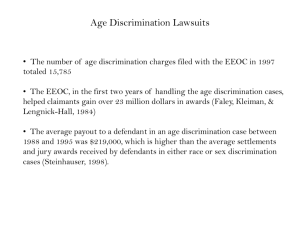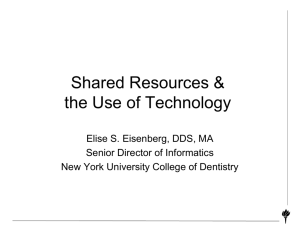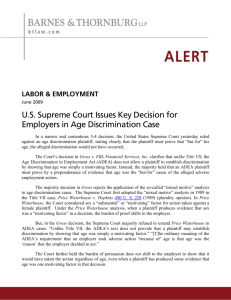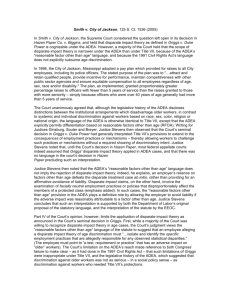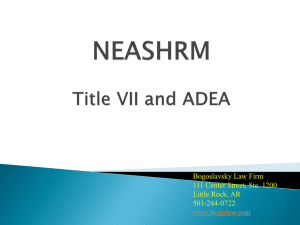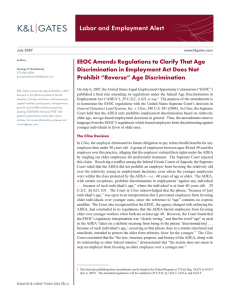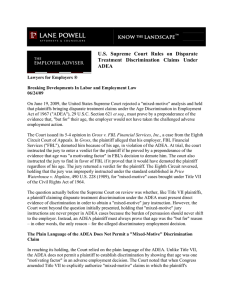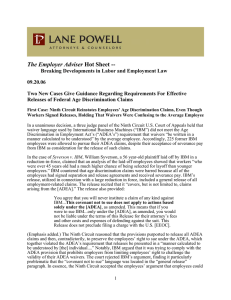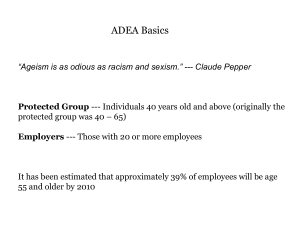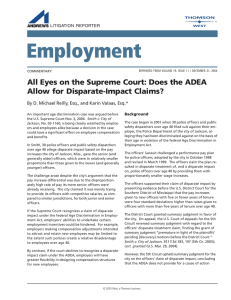Age Discrimination In Employment Act Of 1967
advertisement
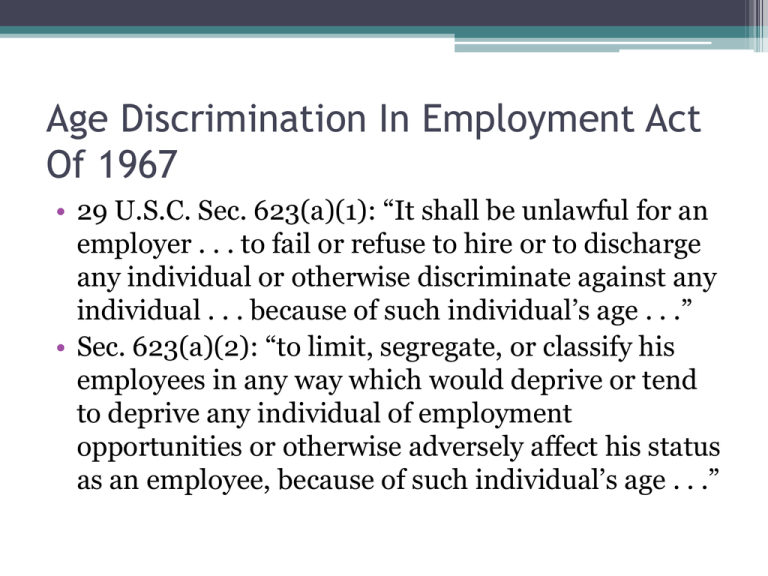
Age Discrimination In Employment Act Of 1967 • 29 U.S.C. Sec. 623(a)(1): “It shall be unlawful for an employer . . . to fail or refuse to hire or to discharge any individual or otherwise discriminate against any individual . . . because of such individual’s age . . .” • Sec. 623(a)(2): “to limit, segregate, or classify his employees in any way which would deprive or tend to deprive any individual of employment opportunities or otherwise adversely affect his status as an employee, because of such individual’s age . . .” The ADEA • 29 U.S.C. Sec. 631(a): “The prohibitions in this Act shall be limited to individuals who are at least 40 years of age.” • Sec. 630(b): “The term ‘employer’ means a person engaged in an industry affecting commerce who has twenty or more employees for each working day in each of twenty or more calendar weeks in the preceding or current calendar year . . .” The ADEA • O’Connor v. Consolidated Coin Caterers Corp. (U.S. 1996) ▫ Prima facie case elements • Court: “the fact that an ADEA plaintiff was replaced by someone outside the protected class is not a proper element of the McDonnell Douglas prima facie case.” • The “fact that a replacement is substantially younger than the plaintiff is a far more reliable indicator of age discrimination . . .” The ADEA • General Dynamics Land Systems, Inc. v. Cline (U.S. 2004) ▫ Facts; issue • The ADEA’s prohibition of discrimination “because of [an] individual’s age” • Cline’s and the EEOC’s arguments • Court: the text, structure, purpose, and history of the ADEA show “that the statute does not mean to stop an employer from favoring an older employee over a young one.” Cline (cont.) • Justice Scalia’s dissent • Justice Thomas’s dissent ▫ The plain language of the statute permits a lawsuit for discrimination in favor of older workers ▫ Discrimination because of age is not restricted to discrimination because of relatively older age ▫ The meaning of “age” ▫ The EEOC’s interpretation is “consistent with the best reading of the statute” • Persuaded by majority or dissent? The ADEA • Gross v. FBL Financial Services, Inc. (U.S. 2009) ▫ Facts; issue presented in the granted writ of certiorari • Issue: does the burden of persuasion ever shift to the defendant in a mixed-motives claim brought under the ADEA? • Court: unlike Title VII, the text of the ADEA does not provide that age as a motivating factor establishes discrimination Gross (cont.) • In the Civil Rights Act of 1991 Congress amended Title VII but not the pertinent sections of the ADEA • “Because of” means “by reason of: on account of”’ age must be the “reason” the employer acted • The ADEA thus requires that the plaintiff prove that age was the but-for cause of the adverse employment action • Price Waterhouse is not controlling Gross (cont.) • Justice Stevens: the Court decides an issue not posed in the grant of certiorari and not briefed by the parties, amici curiae, or the United States • The Court interprets “because of” in Title VII and the ADEA differently • Price Waterhouse’s construction of “because of” remained the law and should govern ADEA claims
